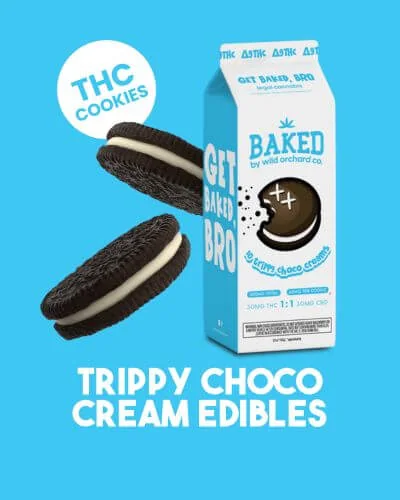Does THCA Produce a High? An Overview
THCA in its raw form doesn’t produce a high; it transforms into THC, the psychoactive component, when heated. This transformation, known as decarboxylation, is crucial for those seeking the psychoactive effects of cannabis. Understanding this process is essential for navigating the complex world of cannabis compounds.
- Decarboxylation Explained: Heat changes THCA to THC, leading to psychoactive effects.
- Raw Form: THCA is non-psychoactive and won’t get you high without heating.
- Scientific Interest: Focus on THCA’s effects and potential health benefits before conversion.
- Legal Distinctions: Regulatory differences between THCA and THC impact legality and use.
- Medical Research: Exploring THCA’s role in treatments, emphasizing non-psychoactive benefits.
The distinction between THCA and THC underscores the importance of consumption methods in achieving desired effects. While raw cannabis contains THCA with potential health benefits, understanding how and when it converts to THC is vital for both recreational and medicinal users. This knowledge also navigates the legal and scientific landscape surrounding cannabis use, highlighting the ongoing research into its therapeutic applications.

Consumption Methods and Effects
Different Ways to Consume THCA and Their Effects
Exploring the different ways to consume THCA reveals its unique effects before it turns into THC. When THCA is consumed in its raw form, such as through fresh cannabis leaves or buds, it doesn’t produce a high. This is because it hasn’t been heated to cause decarboxylation, the process that converts THCA into THC.
- Raw Cannabis: Consuming fresh leaves or buds for non-psychoactive benefits.
- Juicing: Mixing raw cannabis into juices preserves THCA’s properties.
- Tinctures: Sublingual application allows for direct absorption without psychoactive effects.
- Topicals: Applied externally for localized benefits without the high.
- Low Heat Cooking: Incorporating into recipes at temperatures that do not convert THCA to THC.
Understanding the non-psychoactive nature of THCA helps us appreciate its potential in wellness and therapy without altering our mental state. As we explore THCA’s versatility, it becomes clear that its effects depend significantly on the method of consumption. While heating converts THCA to THC, introducing psychoactive qualities, raw or carefully prepared products can offer benefits without the high. This distinction is crucial for those seeking the therapeutic aspects of cannabis without the psychoactive experience, highlighting the importance of informed consumption choices.
The Role of THCA in Cannabis Edibles and Topicals
THCA plays a fascinating role in the world of cannabis edibles and topicals, serving as a cornerstone for those seeking the plant’s benefits without a high. In edibles, THCA must be carefully heated to become THC, the compound that makes us feel high. However, for topicals, THCA remains in its original form, providing benefits without psychoactive effects.
- Decarboxylation: Necessary for activating THC in edibles.
- Non-Psychoactive Topicals: THCA stays intact, offering localized benefits.
- Temperature Control: Key to preserving THCA in cooking.
- Bioavailability: THCA’s absorption varies between edibles and topicals.
- Synergistic Effects: THCA enhances the therapeutic potential of other cannabinoids in topicals.
When it comes to cannabis edibles and topicals, understanding THCA’s role is crucial. For edibles, the heating process activates THC, which means getting the temperature right is essential. This process, called decarboxylation, turns THCA into the THC that affects our brain. On the other hand, topicals made with THCA do not penetrate the bloodstream in the same way, allowing us to use them for their potential benefits without experiencing a high. This makes THCA a versatile compound in the cannabis world, catering to different needs and preferences.

THCa Scientific Explanations and Background to Produce a High
Understanding THCA: The Precursor to THC
THCA, or tetrahydrocannabinolic acid, is the non-psychoactive precursor to THC, the compound in cannabis that makes us feel high. Before THC can affect our minds, it starts as THCA in raw cannabis plants. Through a process called decarboxylation, which involves applying heat, THCA converts into THC. This step is crucial for those looking to experience the psychoactive effects of cannabis. However, without heating, consuming cannabis in its raw form, such as in salads or juices, means THCA remains unchanged. Thus, THCA does not produce a high, allowing people to enjoy the plant’s potential health benefits without the psychoactive effects. This knowledge is key for understanding how different cannabis products work and their effects on our body, highlighting the importance of the conversion process from THCA to THC.
Decarboxylation Explained: The Process That Transforms THCA into THC
Decarboxylation is a chemical reaction that turns THCA, a non-psychoactive compound in raw cannabis, into THC, the substance that gives us a high. This process involves applying heat, which changes the chemical structure of THCA.
- Heat Application: Baking or smoking cannabis activates decarboxylation.
- Chemical Change: THCA loses a carbon atom, becoming THC.
- Temperature Specific: It requires specific temperatures to be effective.
- Time Factor: The longer the heat is applied, the more THCA converts.
- No High Without Heat: Consuming raw cannabis does not lead to a high because THCA remains unchanged.
Understanding decarboxylation is crucial for anyone looking to experience the psychoactive effects of cannabis. The process transforms THCA into THC, making it a key step in producing edible cannabis products and other forms that require activation through heat. This knowledge not only helps in maximizing the benefits of cannabis but also in appreciating the science behind its use. By mastering decarboxylation, we unlock the full potential of cannabis, ensuring the desired effects are achieved.

FAQs: Understanding THCA and Its Effects to Produce a High
What is THCA and how is it related to THC?
THCA, or tetrahydrocannabinolic acid, is a cannabis compound that is the acidic precursor to THC. Through a process called decarboxylation, where cannabis is heated, THCA converts into THC, the psychoactive compound known for producing a high.
Does THCA produce a high when consumed?
No, THCA does not produce a high when consumed in its raw form. It must undergo decarboxylation, turning into THC, to have psychoactive effects.
How does decarboxylation transform THCA into THC?
Decarboxylation is a chemical reaction initiated by heat. During this process, THCA loses a carboxyl group in the form of carbon dioxide and water vapor, transforming into THC, which can produce psychoactive effects.
Can you compare the chemical structures of THCA and THC?
THCA and THC have similar molecular structures but differ due to the presence of a carboxyl group (COOH) in THCA. This slight difference makes THCA non-psychoactive, whereas THC can affect the brain’s cannabinoid receptors to produce a high.
How does your body process THCA?
The body processes THCA differently than THC. Since THCA is non-psychoactive, it doesn’t bind to the brain’s cannabinoid receptors in the same way THC does. Instead, it may interact with other receptors and have potential health benefits without psychoactive effects.
Is there a specific temperature required for decarboxylation to occur?
Yes, decarboxylation requires specific temperatures to effectively convert THCA into THC. Typically, a temperature around 220°F (104°C) for about 30 to 45 minutes is recommended, but this can vary based on humidity, preparation, and the cannabis material itself.
Are there any health benefits associated with THCA?
While research is ongoing, THCA has shown potential in various health areas such as anti-inflammatory and neuroprotective properties. However, it’s important to note that THCA does not produce a high, making it a focus of interest for those seeking the medicinal benefits of cannabis without the psychoactive effects.

THCA and the High: Unpacking Myths and Facts
Many people wonder if THCA, the natural form of THC in cannabis, can make us feel high. The truth is, THCA alone does not produce a high because it needs heat to transform into THC, the psychoactive compound.
- Heat Transformation: Only when heated does THCA become THC.
- Non-Psychoactive: In its raw form, THCA won’t make you feel high.
- Common Myths: Some believe raw cannabis is psychoactive, which is not true.
- Scientific Fact: Research confirms THCA’s non-psychoactive status.
- Personal Experience: Many have tried raw cannabis without feeling high.
When we talk about THCA and its ability to get us high, it’s clear that heat is the missing piece. Without it, consuming THCA through raw cannabis leaves or juices won’t alter our mental state. This distinction is crucial for understanding how cannabis works and debunking myths about its consumption. By keeping this in mind, we can better navigate the complex world of cannabis and its compounds, appreciating the science that makes it all work.

THCa Legal and Regulatory Perspectives
The legal status of THCA varies around the world, reflecting a complex landscape of cannabis regulation. In some places, THCA is legal because it is not psychoactive, unlike THC, which can alter our minds and is often regulated. This distinction is crucial for understanding global cannabis laws.
- Varied Legality: THCA’s legal status changes from country to country.
- Non-Psychoactive Clause: Laws often focus on the psychoactive properties of substances.
- Medical Use: In regions where it’s legal, THCA is used medically.
- Regulatory Challenges: Differentiating THCA from THC poses legal challenges.
- Impact on Research: Legal status affects THCA research opportunities.
Laws distinguishing between THCA and THC are rooted in the compounds’ effects. While THC is widely regulated due to its psychoactive nature, THCA does not produce a high, leading to less stringent controls in some jurisdictions. This legal distinction affects everything from product labeling to law enforcement practices, emphasizing the need for clear scientific understanding among regulators.
The implications of THCA’s legality on medical cannabis use are profound. In regions where THCA is recognized for its potential benefits without psychoactive effects, it has opened doors for medical research and treatment options. This legal acknowledgment supports the development of non-psychoactive cannabis products, catering to patients seeking relief without the high associated with THC. The evolving legal landscape around THCA highlights the importance of informed legislation that considers the compound’s unique properties and potential benefits.

Medical and Therapeutic Potential
Exploring the Therapeutic Benefits of THCA
THCA, the precursor to THC in cannabis, is gaining attention for its potential therapeutic benefits without causing a high. Researchers and medical professionals are exploring how this compound could help us in ways we never thought possible, all without the psychoactive effects associated with THC.
- Anti-Inflammatory Properties: THCA has shown promise in reducing inflammation.
- Neuroprotective Effects: It may protect brain cells from damage.
- Anti-Nausea Potential: Early studies suggest THCA can help with nausea.
- Pain Relief: Some evidence supports its use in pain management.
- Growth of Medical Research: Interest in THCA for medical treatments is expanding.
As we dive deeper into the therapeutic benefits of THCA, it’s clear that this compound could play a significant role in future medical treatments. By understanding THCA’s potential, researchers can unlock new ways to treat various conditions without the psychoactive side effects of THC. This exploration could lead to groundbreaking medical advancements, providing patients with new, non-intoxicating options for relief. The ongoing research into THCA’s effects shows a promising future for cannabis in medicine, emphasizing the importance of this compound in the broader context of therapeutic cannabinoids.
The Potential of THCA in Treating Chronic Pain and Inflammation
Exploring the potential of THCA in treating chronic pain and inflammation unveils its promise as a non-psychoactive solution. As research delves deeper, we are beginning to understand how this compound can offer relief without the high associated with THC.
- Non-Psychoactive Relief: THCA may reduce pain without altering mental state.
- Anti-Inflammatory Action: Studies suggest a significant reduction in inflammation.
- No High: Patients can potentially manage pain without experiencing a high.
- Research Growth: Increasing interest in how THCA can be used medicinally.
- Future Therapies: Potential for new treatments focused on THCA.
The exploration of THCA’s role in managing chronic pain and inflammation is promising, offering a glimpse into future pain management therapies. This compound’s ability to provide relief while remaining non-psychoactive could revolutionize how we approach chronic conditions, emphasizing the importance of ongoing research and development. With each study, we move closer to understanding how THCA could be harnessed to improve the quality of life for those suffering from chronic pain and inflammation, marking a significant step forward in medicinal cannabis use.

How to Safely Consume THCA
Safely consuming THCA requires knowledge of its behavior both in raw form and when heated, including modern consumption methods like vaping. Whether seeking the health benefits of raw THCA or the psychoactive effects of THC, understanding these methods ensures a tailored and safe experience.
- Raw Consumption: Incorporate raw cannabis into your diet through salads, smoothies, or juices to enjoy THCA’s non-psychoactive benefits.
- Decarboxylation: To convert THCA into THC, gently heat cannabis in an oven at 220°F (104°C) for 30-45 minutes. This is ideal for making edibles.
- Vaping: Use a vaporizer with a precise temperature control to activate THCA into THC without combustion, providing a cleaner inhalation experience.
- 510 Batteries for Cartridges: Attach a cannabis oil cartridge, rich in THCA or THC, to a 510 battery for easy and controlled dosing through inhalation.
- Storage Tips: Properly store cannabis away from direct sunlight and heat to maintain THCA’s stability and prevent unwanted decarboxylation.
Understanding the dual nature of THCA and THC, and the specific methods to consume each safely, empowers users to fully explore the potential of cannabis. Whether through raw consumption for health benefits or controlled heating for psychoactive effects, the key is precise application and storage. These guidelines help navigate the complexities of cannabis consumption, ensuring a positive and safe experience for both medicinal and recreational users.

 Flash Sale
Flash Sale  Party Bundle
Party Bundle  Back in Stock!
Back in Stock! 










